|
|
|
Sort Order |
|
|
|
Items / Page
|
|
|
|
|
|
|
| Srl | Item |
| 1 |
ID:
191354
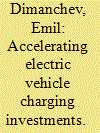

|
|
|
|
|
| Summary/Abstract |
Replacing conventional cars and trucks with battery electric vehicles requires a rapid expansion of fast-charging infrastructure. However, private sector charging infrastructure investments are delayed by unfavorable project economics and uncertainty in future demand. Prior research has addressed the former using standard net present value (NPV) methods, but neglected the latter. To address this gap, this paper introduces a real options model of charging investments, which quantifies the option value of delaying investment under uncertainty. We use this model to assess the implications of optionality in a representative case. Our analysis provides indicative estimates of how investment timing is impacted by alternative policy options: grants, long-term contracts, demand charge re-design, and Zero Emission Vehicle standards. We estimate that if grant subsidies are informed by a traditional NPV analysis, firms would delay investing by more than 5 years. Perhaps surprisingly, even low levels of risk incentivize long delays. We find that policies targeting optionality are substantially more cost-effective than the traditionally used grants. Specifically, we calculate that long-term contracts for differences can trigger immediate investments at a cost 68% lower than grants. A simpler but relatively cost-effective alternative is to introduce a phase-out schedule for grants to discourage investment delays.
|
|
|
|
|
|
|
|
|
|
|
|
|
|
|
|
| 2 |
ID:
159297
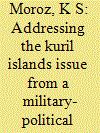

|
|
|
|
|
| Summary/Abstract |
This paper looks back at the origins of the dispute over the ownership of the Kuril Islands, its current state and military political prospects of its future development.
|
|
|
|
|
|
|
|
|
|
|
|
|
|
|
|
| 3 |
ID:
163303
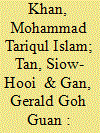

|
|
|
|
|
| Summary/Abstract |
This article presents the advanced financial literacy of Malaysian Gen Y investors and investigates whether literacy varies across demographics and ethnicity, and how financial literacy is related to investing decisions. In a survey-based study (N = 231) with the estimation of crosstab, ordered logistic regression and binary logistic regression, the results suggest that Gen Y investors display a medium level of financial literacy and that investors with certain demographic characteristics and ethnicity display a relatively higher level of financial literacy. Literacy items such as knowledge of stocks and bonds, functioning of the stock market, working of long-term bonds and mutual funds, and riskiness of bonds versus stocks are more closely related to investors’ trading, risky share investment, willingness of risk-taking, stock market participation and perceived portfolio returns. The results imply a clear scope to improve Gen Y investors’ financial literacy by concentrating on a certain socio-demographic groups and specific financial literacy items.
|
|
|
|
|
|
|
|
|
|
|
|
|
|
|
|
| 4 |
ID:
132540
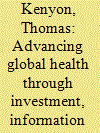

|
|
|
|
|
| Publication |
2014.
|
| Summary/Abstract |
The past decade has witnessed unprecedented levels of investment and engagement in global health spurred by the global HIV/AIDS crisis, the development of the Millennium Development Goals, momentum in polio eradication, and global outbreaks of infectious diseases such as SARS with its US$40 billion cost to society. Characterized by a sense of urgency, pragmatism, and opportunity, global health services and public health systems are being advanced to respond to rapidly expanding demands with dramatic results. However, much more remains to be done. After a decade in emergency mode, the next phase of global health work requires an even more precise approach and smarter investments. Many "donor" nations and organizations have tightened their belts in response to the recent economic downturn, while at the same time increasing the numbers of "recipient" countries, and are now better able to invest more of their own resources to benefit and protect their own citizens. In this climate, global health investments in programs and innovations must be better targeted and better informed by strategic information more than four-fold from US $6.7 billion in 1993 to US $28.4 billion in 2011. Accompanying this investment was a striking decline in mortality in children under five years of age from 12.6 million deaths in 1990 to 6.6 deaths million in 2012. Improvements in health are not the only positive outcome of these investments. The same Commission concluded that global health is a smart investment - for every dollar invested in health, it can be expected that there will be a 10-20 fold return in economic benefit to society. Healthier people are more productive and contribute back to the economy. Healthier people also lower health care costs, naturally, by requiring less care.
|
|
|
|
|
|
|
|
|
|
|
|
|
|
|
|
| 5 |
ID:
122396
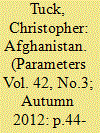

|
|
|
|
|
| Publication |
2012.
|
| Summary/Abstract |
Why has ending the war in Afghanistan proved to be so problematic? In
theory, the decision to end a war should be relatively straightforward.
One or more of the belligerents determine whether or not it is worth continuing the conflict and, as long as at least one of them decides that continuing to
fight is not worth the investment, peace is offered and the conflict terminates.
Clausewitz encapsulates this rational, commonsense approach to the ending
of war when he asserts: "Once the expenditure of effort exceeds the value of
the political object, the object must be renounced and peace must follow."1
By
this logic, and in the context of Afghanistan, the strategic dilemma associated
with how and when to end the war could have been avoided by engaging in a
rational cost-benefit analysis: how much has the war cost and what is the value
of the objectives we were pursuing? Once the former exceeded the latter, then
the Coalition should have struck a deal with the Taliban and left Afghanistan.
Instinctively, of course, we know that the decisions involved in ending a war
cannot be as simple as this rational cost-benefit analysis. But, why is that so?
|
|
|
|
|
|
|
|
|
|
|
|
|
|
|
|
| 6 |
ID:
129969
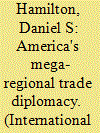

|
|
|
|
|
| Publication |
2014.
|
| Summary/Abstract |
The United States is currently negotiating two massive regional economic agreements, one with 11 Asian and Pacific Rim countries and the other with the 28-member European Union. The Trans-Pacific Partnership (TPP) and the Transatlantic Trade and Investment Partnership (TTIP) herald a substantial shift in US foreign economic policy as Washington turns its focus from the stalemated Doha Round of multilateral trade negotiations and scattered bilateral trade agreements to 'mega-regional' trade diplomacy. As the only party to both negotiations, Washington seeks to leverage issues in one to advance its interests in the other, while reinvigorating US global leadership.
|
|
|
|
|
|
|
|
|
|
|
|
|
|
|
|
| 7 |
ID:
176415
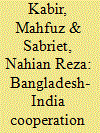

|
|
|
| 8 |
ID:
127459
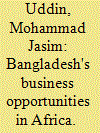

|
|
|
| 9 |
ID:
120198
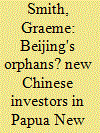

|
|
|
|
|
| Publication |
2013.
|
| Summary/Abstract |
This paper will explore the perspectives and narratives developed by three different sets of Chinese investors in Papua New Guinea (PNG): investors in the retail, mining, and construction sectors. It is estimated that 90 per cent of new Chinese private investors in the PNG retail sector hail from Fuqing, a coastal community in Fujian province with a long history of transnational migration. Larger state-owned mining ventures and construction companies draw on a more disparate workforce, even though they are headquartered in Beijing. All three sets of investors face different degrees of stigmatization from their competitors, the media, and different Chinese and local actors. Based on interviews with Chinese investors in PNG and China, and drawing on Chinese scholarly studies, this paper will explore the interaction of these three groups of investors with Chinese state and non-state actors, and evaluate how this shapes the process of "localization." The paper will examine how relations with state and non-state actors in PNG are evolving over time, as both groups find ways to "get things done" in a country where mainland Chinese investors have a short history of engagement.
|
|
|
|
|
|
|
|
|
|
|
|
|
|
|
|
| 10 |
ID:
025227
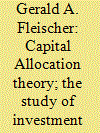

|
|
|
|
|
| Publication |
New York, Meredith Corporation, 1964.
|
| Description |
xiii,291p.
|
|
|
|
|
|
|
|
|
|
|
|
Copies: C:1/I:0,R:0,Q:0
Circulation
| Accession# | Call# | Current Location | Status | Policy | Location |
| 004036 | 658.152/FLE 004036 | Main | Withdrawn | General | |
|
|
|
|
| 11 |
ID:
110389
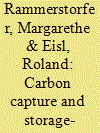

|
|
|
|
|
| Publication |
2011.
|
| Summary/Abstract |
The following article deals with real options modeling for investing into carbon capture and storage technologies. Herein, we derive two separate models. The first model incorporates a constant convenience yield and dividend for the investment project. In the second model, the convenience yield is allowed to follow a mean reverting process which seems to be more realistic, but also increases the model's complexity. Both frameworks are to be solved numerically. Therefore, we calibrate our model with respect to empirical data and provide insights into the models' sensitivity toward the chosen parameter values. We found that given the recently observable prices for carbon dioxide, an investment into C O2-storage facilities is not profitable.
|
|
|
|
|
|
|
|
|
|
|
|
|
|
|
|
| 12 |
ID:
100954
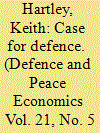

|
|
|
|
|
| Publication |
2010.
|
| Summary/Abstract |
What is the case for defence and is it a worthwhile investment? This question is addressed for two contrasting nations, namely, the UK and New Zealand. Economists have a set of standard analytical tools for addressing the question but they are difficult to operationalise. This paper provides policy-relevant answers.
|
|
|
|
|
|
|
|
|
|
|
|
|
|
|
|
| 13 |
ID:
041169
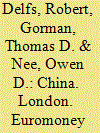

|
|
China
/ Delfs, Robert; Gorman, Thomas D.; Nee, Owen D.
|
1986

|
|
|
|
| Publication |
London, Euromoney Publications Limited, 1986.
|
| Description |
192p.Hardbound
|
| Standard Number |
0903121824
|
|
|
|
|
|
|
|
|
|
|
|
Copies: C:1/I:0,R:0,Q:0
Circulation
| Accession# | Call# | Current Location | Status | Policy | Location |
| 029425 | 382.951/DEL 029425 | Main | On Shelf | General | |
|
|
|
|
| 14 |
ID:
119900
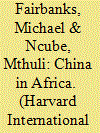

|
|
|
|
|
| Publication |
2012.
|
| Summary/Abstract |
Myths and realities about China's ambitions in Africa abound: China is monolithic, mired in stale ideology, subverting the Bretton Woods system, and unwilling to provide global public goods. Another is that China has no "soft power," that is, the ability to engage almost one billion Africans by persuasion, attraction, and market relations rather than brute economic and military force.
|
|
|
|
|
|
|
|
|
|
|
|
|
|
|
|
| 15 |
ID:
075041
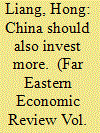

|
|
|
|
|
| Publication |
2006.
|
| Summary/Abstract |
Hong Liang, senior China economist at Goldman Sachs, finds a bone of contention with the IMF over investment in China.
|
|
|
|
|
|
|
|
|
|
|
|
|
|
|
|
| 16 |
ID:
166335
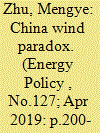

|
|
|
|
|
| Summary/Abstract |
China has seen a surge in wind power installation over the past decade, and is now the world leader in installed capacity. However, wind curtailment – i.e., when the power grid frequently interrupts the power connection of installed wind capacity – has become an increasingly serious problem. But despite wind curtailment significantly jeopardizing wind power developers’ profitability in China, companies have continued to invest. This study, based on extensive interviews with decision-makers in China's Central State-Owned Enterprises (CSOEs), attempts to explain this seeming paradox. Since the majority of wind power investment in China has been made by CSOEs, previous findings of SOE studies assume that this continued investment abjures “economic rationality” due to political/policy burdens. However, this study shows that this is not necessarily accurate. CSOEs’ investment behavior also accords with market logic, as they competed fiercely over wind power sites, increasing investment scale as a rational long-term strategy of profitability. We also find that the embrace of market logic by CSOEs has resulted from recent economic and power sector reforms. For a more efficient market, policy-makers must pay greater attention to the quality of competition among CSOEs.
|
|
|
|
|
|
|
|
|
|
|
|
|
|
|
|
| 17 |
ID:
152981
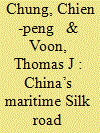

|
|
|
|
|
| Summary/Abstract |
This article focuses on China’s Maritime Silk Road initiative, paying particular attention to Southeast Asia, the initiative’s key focus. It examines the political and economic costs and benefits of participation in the initiative for Southeast Asian countries, and identifies the rationales that may enhance or diminish the initiative’s success.
|
|
|
|
|
|
|
|
|
|
|
|
|
|
|
|
| 18 |
ID:
171868
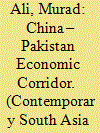

|
|
|
|
|
| Summary/Abstract |
China–Pakistan Economic Corridor (CPEC), a key artery of China’s Belt and Road Initiative (BRI), has attracted the attention of researchers and policymakers within and outside Pakistan. A blend of investment-loan-grant model of over US$ 46 billion, CPEC contains projects aimed at building energy and communication infrastructure and industrial zones. Based on the analysis of primary and secondary data, this study aims to answer two questions: first, what are the main socio-economic or geostrategic prospects of CPEC for Pakistan and China? Second, are there any constraints and challenges in the implementation of CPEC projects and how are these going to be addressed? The paper examines CPEC’s potential in bringing about socio-economic development in Pakistan and its financial and geostrategic significance for China. It also explores key constraints related to the fragile security situation and the potential of CPEC to further exacerbate the geopolitical situation in the region, particularly in South Asia, where it could intensify tension between Pakistan and India as the latter perceives CPEC as a Chinese geopolitical and security project. In addition, the long-term financial implications of CPEC are assessed, with particular focus on its potential to become a debt trap for Pakistan in the long run.
|
|
|
|
|
|
|
|
|
|
|
|
|
|
|
|
| 19 |
ID:
064878
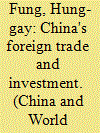

|
|
|
|
|
| Publication |
May-Jun 2005.
|
|
|
|
|
|
|
|
|
|
|
|
|
|
|
|
| 20 |
ID:
126869
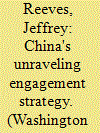

|
|
|
|
|
|
|
|